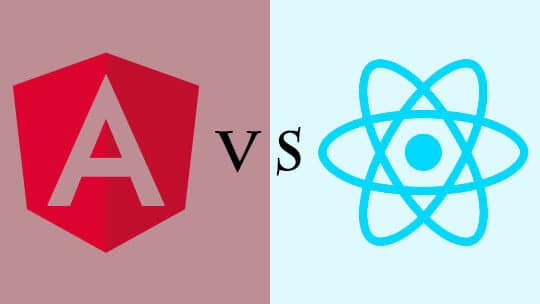Article Note: This article “Angular vs React: Which Framework is Better in 2025?” was first published on March 21, 2019. We last updated this article with fresh information on April 11, 2023.
Technology is evolving rapidly! Languages and frameworks used a few years ago have almost become obsolete and new ones have come up. Most of the updates are being done using earlier languages as a platform. Earlier cost of software development was high, so majorly big businesses and enterprises went for custom software development.
But, over the past decade, technology has reached the smallest size of businesses, and every business owner wants to leverage technology to enhance their business operation. With changing target demographics, platforms used for building modern applications have also evolved. There is a wide array of development frameworks available in the market, but JavaScript (JS) frameworks are still the most preferred. In fact, there are several options like Angular, React, Vue, and further available under JavaScript frameworks.
Mobile app development has become an essential aspect of the tech industry, with more businesses relying on mobile applications to engage with customers. Angular and React are some of the most popular mobile app development frameworks. Determining which framework is better for mobile app development depends on several factors, including the project requirements, development team expertise, and other aspects.
This can turn into a debate! This post will help you decide which framework best suits your project, and it will help minimize the confusion that started with selecting either one of the frameworks. So, let’s begin by analyzing the benefits associated with both these powerful frameworks!
Benefits of JavaScript Frameworks

- JavaScript framework can be used for small, medium, or enterprise-size businesses.
- It can be used for a variety of applications like e-commerce, real-time chat, processing, inventory, and more.
- It is well suited for both the front-end and back-end.
- The presence of pre-built functions ensures efficiency and faster coding. Developers do not need to create everything from scratch.
- The strong community support ensures better collaboration of these frameworks. Any user experience feedback or bug-related feedback reported back to the community is resolved by the expert developers.
- Security-related issues and their solutions are quickly available thanks to the active community.
Talking about web development, any developer is faced with a common question – which framework to go for. Angular and React are the two most common and popular JS frameworks being used today. Before comparing these 2, it is important to have an introduction to each of these frameworks.
Recommended for you: 5 Fantastic Programming Languages Best for Cybersecurity.
What is Angular? What are the Advantages of Angular?

Angular is one of the most commonly used platforms for building web applications and SPAs. It uses a combination of end-to-end tooling, declarative templates, integrated best practices, and dependency injection to solve different problems faced by developers. These features along with data binding eliminate a significant amount of code that developers would have to write otherwise. It is an open-source, front-end web framework, and can be used for desktop, web, and mobile applications. It is being used by thousands of websites, including well-known brands like Intel, NBC, ABC News, and more.
Angular is a JavaScript component and widely used tool for mobile app development. Let’s see some of its significant benefits now.
1. Two-way Data Binding
Two-way data binding in this framework helps users exchange data from the component to the view and vice versa. This allows users to form a communication bridge that functions bi-directionally. Two-way data binding can be established with the help of a ngModel directive in Angular. As a result, the model and the view are consistently kept in sync without effort.
2. Use of TypeScript
As Angular’s primary programming language, TypeScript has several benefits. With the help of editors, including VS Code and WebStorm, help regarding coding is always dynamic. This applies to the features offered, the typical syntactical errors, and the ease of discovering types. Also, TypeScript provides better tools, very clear code, and more scalability.
3. Ionic Support
We know that Angular was the first framework to be supported by the Ionic framework. Cross-platform mobile applications for Android and iOS get developed by wielding Ionic components and the Angular code. Despite supporting more frameworks like ReactJS and VueJS, Angular is still the dominant Ionic framework for mobile application development.
3. Robust Component-based Architecture
Angular’s component-based architecture indicates that every element associated with the app’s UI and supporting functionality are part of a distinct component. The meaning is that the dev team can change the autonomous portions of the app. Further, this can be done without the fear that the updates will have ramifications for all the other elements. Speaking of the components, they can also get reused.
4. Nurtured by Google
The search engine giant Google develops and maintains the Angular framework. As Google is highly trusted, more trust is established for this framework. Coders are ascertained by the fact that the trusted online community of experts in this field will handle every issue or doubt related to this framework. This way, the app developers have greater confidence and faith in Angular app development since Google supports it.

5. Bigger Ecosystem
The Angular framework is actively maintained and has a large community. In this ecosystem, there are plenty of materials related to Angular and beneficial third-party tools.
6. Extremely Supportive of Localization
The best practice associated with making an app “internationalized” will help the app greatly as it has several linguistic options. In other words, the app is ready for use when we bring locales into the picture.
The app developed with the Angular framework is localized when it provides a set of languages about a specific location. Further, most of the issues associated with languages and related to the location, the time details are taken care of via the framework in the best way.
7. Superb Performance
Angular is noted for optimizing the performance of mobile applications in many ways. Some of the factors are mentioned below.
- Classes don’t depend on themselves, and they use hierarchical dependency injection to get info from all external sources, and it dissociates all the elements from dependencies.
- The performance also gets updated due to differential loading, where different bundles get created for other browsers. This helps to reduce the bundle size along with the loading times included.
- When we speak regarding the ahead-of-time compiler, Ivy helps speed up the app compilation and boosts the performance of advanced Angular mobile apps comprising iOS and Android.
8. Productivity
The framework is very productive as it provides all the resources needed to support applications and all the components. It also has a helpful CLI, where you can develop apps and components all set for production with a single command.
What is React? What are the Advantages of React?

ReactJS or React is a popular library for building user interfaces. It builds user interfaces as a tree of several small components. These small components can be used to build excessively complex parts of an application.
It was first developed in 2011 and was deployed on the News Feed of Facebook. It was later given as an open-source platform in May 2013. This framework is maintained by a community of individual developers, companies, and Facebook. This framework can be used as the base for mobile applications or single-page website development.
Now, we will see React Framework’s advantages related to mobile app development.
1. Easy to Master
React is associated with a quick learning curve compared to all the other frameworks, and developers with a fundamental knowledge of JavaScript can use it in a few days. Contributing to this is the clearly defined documentation and tutorials/training videos that help gain greater insight.
React is also easy to use, where the coding gets simplified thanks to the power of the JSX syntax. Developers can use these during the project to save time and work.
2. Optimized Performance
Regarding React mobile app development, the framework’s performance occupies an important role. React uses virtual DOM, paving the way for fast rendering. JSX with code shortcuts. Such shortcuts enable better app performance. Using React framework for mobile app development ensures exceptionally high UI performance and flexibility.
3. Reusability
Mobile app developers can reuse code components unlimitedly without needing to sit and code them again. The advantage is that developers can save time when developing complex solutions, making app maintenance much more accessible.
4. Friendly Cross-Platform App Development
React is helpful in the development of cross-platform apps for major mobile operating systems without any roadblocks in the middle. The code for web solutions in React Native can be compatible with the code for mobile apps because the library follows the same design patterns in both cases. This way, developers can develop numerous solutions within a given time frame and the assigned budget.

5. Cross-Browser Compatibility
React gets used in creating web apps that prioritize the mobile version over its desktop counterpart. The meaning here is that it ensures cross-browser compatibility since mobile and desktop versions function on different browsers.
6. SEO-effective
SEO is very much integral for both web and mobile app development. Several JavaScript libraries and frameworks are not SEO-friendly and have issues with all search engines. React framework is highly SEO-friendly due to server-side rendering, and page loading time is considerably reduced. The result is that mobile apps written in React can get crawled by search engines, optimizing the organic traffic significantly.
You may like: 10 Most Popular Programming Languages to Learn.
7. Solid Community of Developers
As a good development framework, both React and React Native get supported by a dynamic and active open-source community. All the geeks and technological experts worldwide can contribute their wealth of knowledge to help everyone circumvent every development-related problem.
Another benefit is that the developers can easily get enriched by the blogs related to this domain written by all seasoned developers and coders. The learning process gets incredibly enhanced and speeded up as well.
8. Testing
Testing is mandatory when building mobile apps, and React framework provides many testing-related capabilities for all mobile application developers. With the help of tools like Jest and Enzyme, one can debug mobile apps effortlessly and help instantly pinpoint any issues associated with the user interface.
9. Faster Updates of Mobile Apps
Some time back, when we needed to carry out app updates, the development team consumed a lot of time. The reason is that the team had to get the work regarding the build process done separately for every app. However, with React, the apps get updated simultaneously, making everything very simple and quick. Further, the need for an app to get approval from Apple or Android to get updated is eliminated. Therefore, a lot of time gets saved.
Angular vs React: Comparison

“The Angular framework was initiated by Google while React was initiated by Facebook. Both these frameworks have the support of a strong community of developers globally. So, choosing one of these two frameworks can be quite challenging. It is important to understand the differences, pros, and cons of each framework and how they compare against each other to make the right choice.” – mentioned by Dan Piltch, the Co-founder and the former CEO of Freeport Metrics, on the choice of the framework.
Check the following points before making your final decision:
Release
First released in 2010, Angular was developed by Google. There have been substantial shifts in the framework since its first release. The version released in 2018, Angular 7 is the most stable version of the framework currently. React was developed by Facebook and is extensively used across different Facebook products. The latest stable version of React is 16.X which was released in 2018.
Basic difference
The basic difference between both is that Angular is a framework and React is a frontend library with several open-source integrations. So while React can be considered to be an oven, Angular is the entire kitchen. Angular gives you all the tools required to build a web app, while React gives you tools for specific applications.
Architecture
Angular is quite flexible and can be used as an MVVM or MVC architecture. React, on the other hand, is useful for component-based architecture and serves as a view in MVC architecture. It has given us a new way of doing the same things required in the application.
Flexibility
React was launched before Angular, so it has the benefit of being in the market for a longer time. So, this platform has faced more critical tests, problems, and issues. This has made the platform convenient, open, and quite flexible. There are more than 300 ready-made solutions and more than 100,000 React codes present. This USP of React is liked by developers globally. The time-to-market advantage has clearly benefitted React.
Angular is a larger framework structure and has more solutions developed for it. But, in terms of developers, it is still to find more developers like React so direct comparison is not possible.
Support for hybrid and native development
In terms of applications, both these platforms support hybrid and native development. In the case of Angular, there is an Ionic Framework for Hybrid apps while NativeScript is for native apps. On React, you can use react-native for native apps and react-native-renderer for cross-platform apps.
Data binding
React follows one-way data binding while Angular follows 2-way data binding.
Core language
The core language of both these platforms is also a point of comparison. Both follow an OOP style of coding. Angular is a statically typed language while React is a dynamically typed language. In a statically typed language, it is possible to define the variable type while dynamically typed language is a declarative language and is easier to read and write.
Performance
The performance of React is considered better due to the Virtual DOM thus it only updates parts that are needed to view the difference between the earlier and current versions of HTML. This GitHub-like approach reduces the asynchronous data requests on a page and improves speed.
Angular on the other hand uses Common DOM, so the entire tree structure of HTML tags is updated. The document Object Model represents the website page to the browser. It boosts the performance of a system to a large extent.
Popularity
When you compare in terms of popularity, search queries for Angular indicate a higher interest in this framework.
Client and server work
Angular was not developed and created for direct server work, there are alternative methods to use Angular through servers. In the case of React, it can be easily used to render client and server-side work.
Features
Angular offers more out-of-the-box features. Some of these features are built-in into the framework of Angular so there is no option of not using them. So, Angular developers need to be well-versed with all features even for a small project.
React comes with limited features but gives developers the flexibility of choosing the tools and libraries they want based on the project’s needs. The minimalistic approach makes it easier to adapt and learn. React can be easily integrated with different underlying technology including strict MVC.
Management
React uses higher-level concepts like PropTypes, JSX, several approaches to state management, and more. Angular uses RxJS, TypeScript, Angular Management, and a different approach to state management. React does not require additional software or packages. It can be created and launched in API mode.
Size
There is a significant difference in the size of both frameworks and the size of their libraries. The library size of React is around 100 KB while that of Angular is more than 500 KB.
Learning path
Angular has a steep learning curve. It is a complete solution, so mastering Angular requires knowledge of MVC, TypeScript, and other associated elements. The learning curve of React is less steep. Every added functionality is a new learning path.
Best for whom
Angular is a great framework for big companies that have a team of developers familiar with TypeScript. Due to its flexibility, React works well with developers and start-ups new to JS framework development.
Popular users
If you talk about popular users of Angular and React, here is a comparison of who uses which technology. React is being used by Facebook, Uber, Airbnb, WhatsApp, Instagram, Netflix, and Dropbox. Angular is being used by the NBA, Google Express, Delta, Eat24, and Wix.
You may also like: The 5 Best Programs for Blogging.
Angular vs React: Final Words

Both Angular and React have a lot to offer their users. Angular is a mature framework while React also works well with anyone starting with JS frameworks. There is no better framework as the answer will depend on a wide range of factors.
Depending on the requirement and features of your project, you need to decide which one is better for your application. A detailed analysis of your use cases and environment will give a clearer picture of which framework is better for you. If your project requires flexibility, size, and simplicity, React is what you need. If your project requires the greatest of functions and endless possibilities, Angular is the platform you go for.
Right from the history of both frameworks to their potential and possibilities of growth in the future, there are several comparison factors. Angular and React both are ruling the JS framework domain and are expected to do so in the coming years too. So, choose wisely by weighing your project requirements, and you can get the best insight when choosing the framework.
We have written this article in association with Sam Gillbert. Sam is the Business Analyst at Pyramidion Solutions, a full-Stack development firm.





